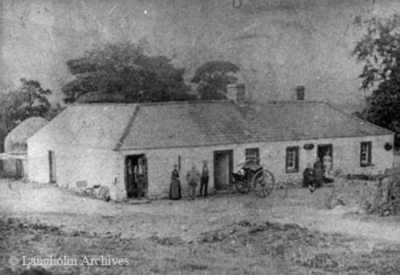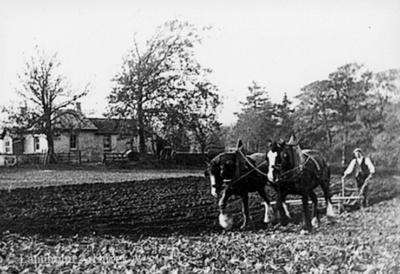Food supply from domestic farms became particularly important during the Great War after the curtailment of imports. Various Langholm farms contributed additionally by making some of their workforce available for military service.
The Duke of Buccleuch owned 13 farms in the Langholm parish in 1915, with two others being owned by Rev David Maxwell. Below is a list of the Buccleuch farms with their tenants.
| Farm | Tenant | Where Born | Years as Tenant in 1915 | Military Service |
|---|---|---|---|---|
| Becks and Caulfield | John Fleming | Carstairs, Lanarkshire | 34 | Son Robert Fleming, Royal Garrison Artillery |
| Bloch | John and James Telfer (brothers) | Castleton, Roxburghshire | 4 | |
| Bloch Well | Robert Thomson | |||
| Cleuchfoot | Alexander Hogg | 1 | Son Thomas Hogg, Lothian and Border Horse | |
| Hall Crofts | John McVittie | Langholm, Dumfriesshire | 25 (family >95) | |
| Langholm Mill (corn) and farm | Simon Irving | Langholm, Dumfriesshire | 53 (family >85) | Grandson Peter Irving, Royal Scots Fusiliers; killed 7 Sep 1917 |
| Middleholm | William Rutherford | |||
| Milnholm | James and Thomas Carlyle (brothers) | Middlebie, Dumfriesshire | 10 (family 25) | |
| Murtholm | Thomas Gaskell | Langholm, Dumfriesshire | 32 | |
| Old Irvine | Andrew Aitchison | Langholm, Dumfriesshire | 31 | |
| Potholm | John Armstrong | Kirkandrews, Cumberland, England | 5 | Sons Robert and Harry, Gordon Highlanders; Harry died of wounds and illness 9 Dec 1918 |
| Terrona* | James Paterson | Ewes, Dumfriesshire | 10 (family 75) | Sister Daisy, navy nurse; sister May, army nurse; James, Queen’s Own Royal Glasgow Yeomanry; brother William, army Royal Flying Corps |
| Westwater | James Elliot | Langholm, Dumfriesshire | 15 |
* Split between Langholm and Ewes parishes
The Patersons of Terrona made a particularly dedicated contribution to military service, with four siblings joining up, including two sisters as nurses. The family was a pillar of the local community, including James (‘JJ’) and his late father John (‘JWJ’), who were both Common Riding cornets, in 1909 and 1850 respectively.
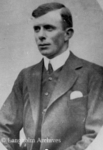

JJ Paterson’s sister Daisy was shipwrecked in October 1914 while a nurse on board HMHS (His Majesty’s Hospital Ship) Rohilla, just off the coast of Whitby, Yorkshire. The vessel was sailing from the Firth of Forth in Scotland to Dunkirk to collect wounded soldiers when it encountered bad weather, may have a hit a mine and ended up on rocks. Daisy survived but 83 out of the 229 persons on board died.
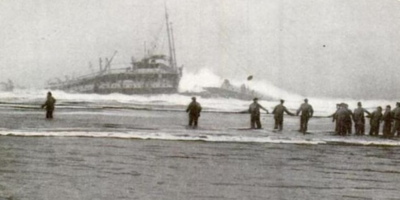
Another survivor was Mary Roberts from Nottingham, a stewardess who had been transferred from the White Star Line. It was her second shipwreck, having survived the Titanic’s sinking in April 1912.
One of the closest farms to town was Murtholm, with its house seen in the left of the photo below. Behind it are some of the woollen mills and below right is the whisky distillery. Murtholm’s tenant Thomas Gaskell was also a slate merchant who provided slates for the Waverley Mill when it was constructed in 1871.
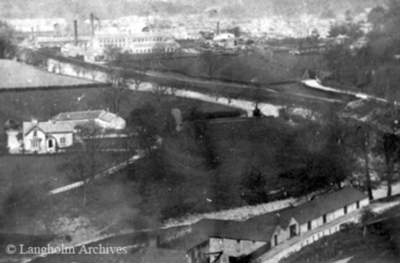
Around three miles away was Milnholm, with tenants James and Thomas Carlyle, great-nephews of the prominent Victorian writer Thomas Carlyle who was born in Ecclefechan, 15 miles south-west of Langholm. Milnholm can be seen in the photo below, together with Potholm.
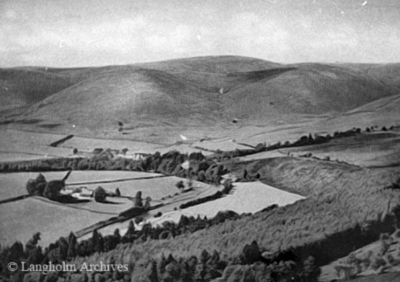
Potholm’s tenant John Armstrong lost his younger son Harry who died at age 22 from wounds and pneumonia in a military hospital in northern France in December 1918. His elder son Robert survived front-line service.
The longest-standing tenant farmers in the area were the McVitties of Hall Crofts, who had managed the property since before 1820.
